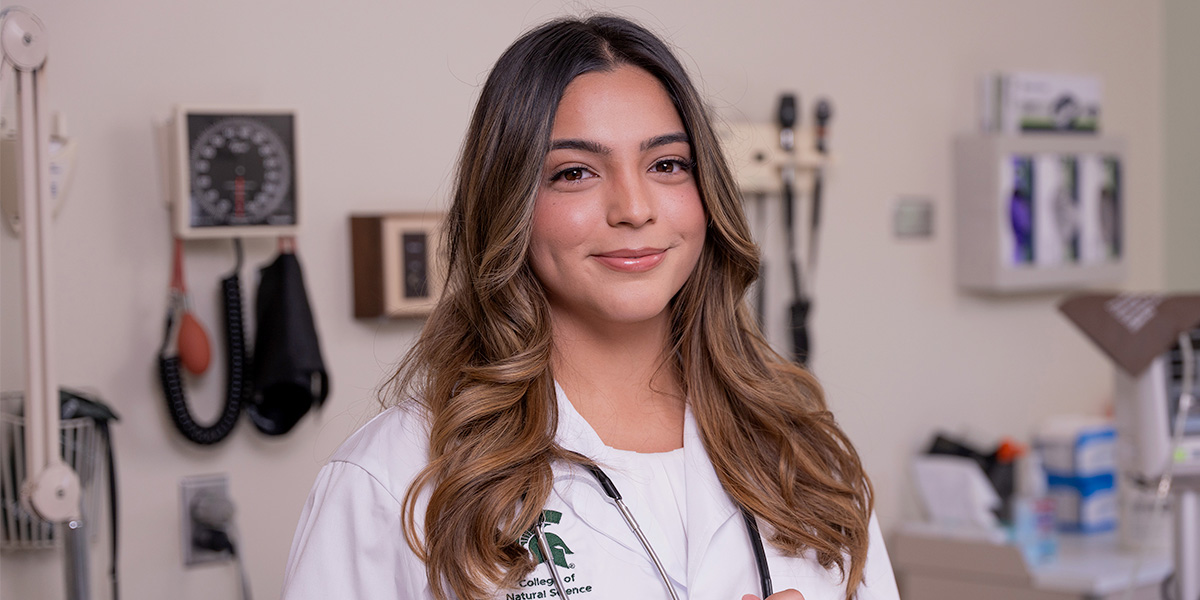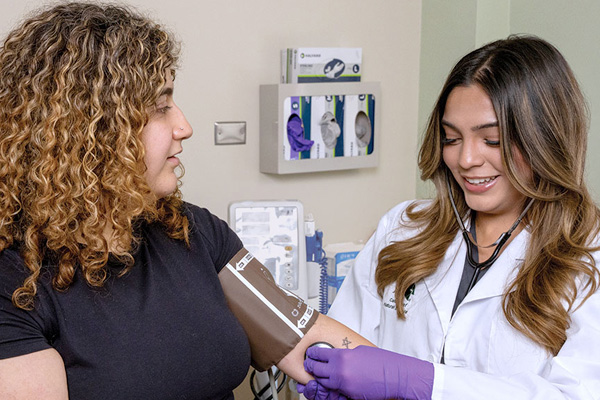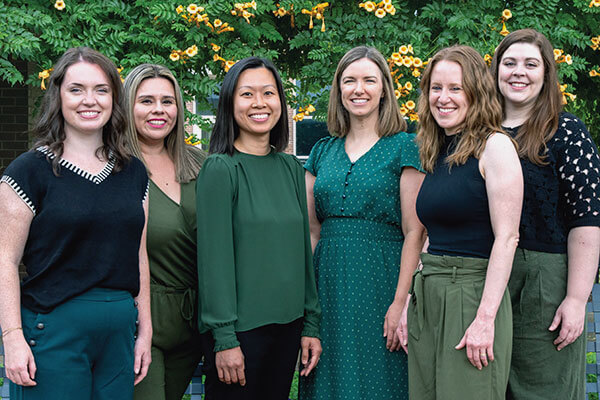The Future of Health Starts Here
How MSU is training the next generation of healthcare professionals
By Sam Brichta

family had ever gone to college, much less worked in healthcare. And as a Filipina, she'd never met a physician who looked like her.
Then Paa arrived at the Michigan State University College of Natural Science and encountered a diverse class of Human Biology majors, healthcare providers of color and other Filipina Human Biology students. She felt more comfortable, and her perspective shifted. Today, the 2024 Human Biology graduate is a second-year medical student at the MSU College of Human Medicine.
"I started my journey at MSU doubtful that I would be successful in the application process to medical school,” Paa said. “But my confidence grew through coursework, hands-on internships and the mentors, advisors and peer support available at MSU."
A foundation of science, a future of care
The challenges facing today's healthcare professionals are as diverse as they are demanding. From addressing persistent health disparities to navigating the ethical complexities of artificial intelligence, or AI, the healthcare landscape is in constant flux. MSU's College of Natural Sciences, with its commitment to a strong scientific foundation and a forward-thinking approach, is where many aspiring doctors, physician assistants, researchers and other healthcare leaders like Paa begin their journey.
Lizzie Ochoa, a third-year Human Biology student, shares a similar drive, rooted in her own experiences with healthcare access. Growing up in a Hispanic, low-income household, she witnessed firsthand how financial and language barriers limited access to healthcare.

These early experiences instilled in her a powerful sense of purpose, fueling her desire to take the first step toward healthcare leadership and dive into the Human Biology program at MSU.
"I want to advocate for patients' needs and create safe environments for all," Ochoa said. "And I hope to have opportunities to create long-lasting impacts within the Hispanic/Latinx community within our healthcare system."
More than a major
For both Paa and Ochoa, the College of Natural Science's Human Biology program is more than just an academic major — it's a launchpad for their career aspirations.
"Human Biology is an interdepartmental major designed to serve pre-health students," Program Director Cori Fata-Hartley said. Since its inception in 1999, the major has experienced tremendous growth, becoming the largest major in the College of Natural Science and the largest coordinate major in Lyman Briggs College.
"The guidance and support from the staff and the different resources they provide have helped guide me towards making the most of my experience at MSU." Lizzie Ochoa
'26 Human Biology
Fata-Hartley points to the program's comprehensive curriculum as a cornerstone of the appeal to students: a rigorous exploration of the core sciences that form the foundation of human health. Students immerse themselves in the intricacies of chemistry, physics, math and biology, gaining a profound understanding of the principles that govern life itself.
"Our students receive a strong foundation," Fata-Hartley said. "They get all the science that they need to take entrance exams for the different graduate and professional schools and a strong understanding of how the body works."
Beyond the classroom: Where experience takes root
But the College of Natural Science's commitment to its students extends far beyond the lecture hall and laboratory. The college recognizes that a well-rounded healthcare professional needs more than just scientific knowledge — they need real-world experience, mentorship and a robust support system.
That's where the college's Pre-Health program comes in, a supportive community dedicated to helping students reach their goals in the health professions.
"Pre-Health at MSU is a one-stop shop for undergraduates interested in any healthcare career," said Janae Lawler, Director of Academic Advising and Strategic Initiatives. "Our advisors are here to help students explore different major options, understand the requirements for professional school and build a successful undergraduate experience that will maximize their potential."
The program provides tailored advising services, access to a wealth of online resources and opportunities for professional development, ensuring that students are well-prepared for the rigorous application processes of medical and other health-related schools.
"The Pre-Health advising group has been a huge help in preparing me for the next step after graduation," Ochoa said. "The guidance and support from the staff and the different resources they provide have helped guide me towards making the most of my experience at MSU."

One focus of Pre-Health and the Human Biology major is building opportunities to connect students with faculty and contribute to the academic community. For Paa, this included working as an undergraduate learning assistant for a core laboratory human biology course for two years.
Paa built a relationship with her course coordinator, who eventually went on to write a letter of recommendation for her medical school applications. Mentors in the program also helped her navigate the principles of scientific inquiry as the teaching team worked to support student learning.
Meeting the Evolving Challenges of Healthcare
In an era of rapid technological advancement and evolving societal needs, the healthcare landscape is constantly changing. The College of Natural Science is committed to ensuring that its graduates are not only well-versed in the foundational sciences but also equipped to tackle the complex challenges of the 21st century.
"We are preparing future leaders to address biologically based challenges in health, medicine and the biomedical sciences," Fata-Hartley said. "We're also focused on preparing folks to deliver inclusive and equitable healthcare to a diverse population."
This commitment is reflected in the program's dynamic curriculum. New courses like Human Biology and Society and Cellular Basis of Disease delve into the social determinants of health and health inequities, providing students with a crucial understanding of the societal factors that influence patient well-being. This perspective is being infused throughout the curriculum, ensuring that MSU graduates are skilled clinicians and passionate advocates for equitable healthcare access.
A Launchpad for Diverse Career Paths
The College of Natural Science's multiple healthcare-related majors, including physiology, neuroscience, biochemistry and molecular biology and biomedical laboratory diagnostics, are designed to be a launchpad for a wide array of career paths. While many graduates pursue advanced degrees in medicine and other professional fields, the program also equips students with the critical- thinking skills, analytical abilities and scientific knowledge necessary for success in diverse fields, such as teaching, financial analysis, law and community health organizations.
"Our students are broadly trained," said Fata-Hartley. "They are learning how to think critically, how to evaluate claims based on evidence and how to communicate to diverse audiences, all skills that will serve them well regardless of their career path."
As the most diverse major in the College of Natural Science, the Human Biology major attracts a high proportion of students from racial and ethnic groups that have historically been excluded from science and medicine, first-generation backgrounds and students with limited financial resources. Notably, the program's overall graduation rate mirrors that of the university, demonstrating MSU's dedication to ensuring the success of all its students.
The Future of Health Sciences at MSU: A Vision for Integration
As the MSU College of Natural Science looks to the future, it is guided by a bold vision to transform health sciences education and research. MSU President Kevin Guskiewicz recently launched the One Team, One Health initiative, a strategic effort to harness the university's vast educational, research and clinical resources and forge stronger connections between its human, animal and environmental health programs.
This initiative, rooted in the interconnectedness of all life, seeks to prepare the next generation of healthcare providers to address the complex health challenges of the 21st century. It aligns with the Pre-Health care majors' emphasis on a holistic understanding of health and its commitment to fostering interdisciplinary collaboration.
Now on a path to bring representation, knowledge and forward-thinking strategies to their respective fields, students and alumni like Ochoa and Paa serve as compelling illustrations of the next generation of healthcare professionals, trained here at MSU's College of Natural Science.
